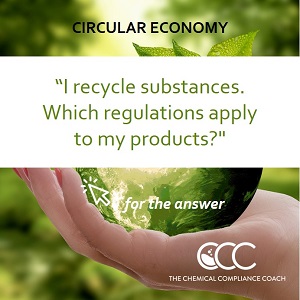I recycle substances. Which regulations apply to my products?
Recycling and recovery typically involve a series of process steps, often performed by multiple waste management partners. Sometimes only the final recycling step will result in the recycled material that no longer classifies as ‘waste’ under the EU waste legislation, or only a fraction of the material is recovered.
Waste materials, including wastes that arise during recycling processes, are subject to waste legislation. All recovery steps (including collection, pre-processing and mixing), which do not result in a non-waste material are considered part of the waste treatment process.
According to Article 6 of the Waste Framework Directive (2008/98/EC), materials “cease to be waste” when they have undergone a recovery operation and meet specific criteria, including:
- The substance or object is commonly used for specific purposes;
- A market or demand exists for such a substance or object;
- The substance or object fulfils the technical requirements for the specific purposes and meets the existing legislation and standards applicable to products; and
- The use of the substance or object will not lead to overall adverse environmental or human health impacts.
After a material ceases to be waste, the recycling process is at an end, and the material is considered a substance, mixture or article. From that moment, REACH and CLP obligations start to apply.
Please note: the constituents of a recycled substance may have been present as such in the waste stream or may have been obtained from the waste stream through chemical modification during the recovery process. In practice, identification of the process step in which the material ceased to be waste is not always simple.

